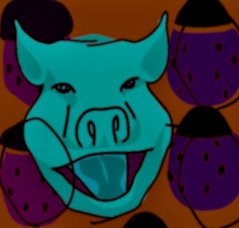Anyone who has lived overseas will tell you that it is the unpredictable and unfamiliar that reinvigorates you, opens your eyes, and changes your perception of life. Such was the case as we counted down to the new year by joining the Bavarian throng to celebrate "Silvester."
"Silvester,"according to "The Local," is the German name for New Year's Eve ever since the Gregorian calendar in 1582 was changed to make the last day of the year December 31. It was then that St. Sylvester's day was known as New Years Eve. The New Year's traditions are directly related to the pagan Rauhnachte practices of heathen Germanic tribes that took place at the end of December.
Hubby and I decided to celebrate Silvester, just the two of us, at a wildly popular dining establishment called the "Blue Nile." It was a very appropriate choice since New Year's 2009 graced us with a "Blue Moon." We thought it was more than coincidental and decided this would be the year of the "blues" for us. The Blue Nile is an Ethiopian restaurant and we were thrilled with the cusine, staff, and the ambiance. Ethiopian food is eaten with the fingers or scooped with flat breads. Think of lentils, couscous, tender lamb, homemade baklava dripping with honey and a mango lasse--delicious!
Germans celebrate Silvester like most of the rest of the world, with fireworks. Fireworks are sold at the local grocery stores and are usually purchased with bottles of champagne and then put into a tote bag to transport to a venue where others with similar bags are joining in loud gatherings. The whole idea, as in the U.S., is to make a lot of noise. Many think this goes back to the early days of the Germanic Teutons who were interested in making enough noise to drive away evil winter spirits.
Rauhnacte, or twelve days of Christmas, was a time that early Germans believed their future could be foretold. They still participate in party games such as Bleigiessen (lead pouring). Lead is melted in an old spoon with a candle. It is then poured into cold water and the shape that appears supposedly has meaning for the New Year. Some shapes indicate career success, some that new friendships will be forged in the following year.
Oracle traditions on Silvester have people swinging pendulous objects, like a necklace or watch, and asking yes--or--no questions. If the pendulum swings in a circle, the answer is "yes," if it swings vertically, the answer is "no," and if it swings horizontally, the answer is uncertain. They also open a bible and close their eyes and point to a random verse. Bibelstechen provides some information or advice for the rest of the upcoming year.
Of all of the German traditions, the one I find the most peculiar is the one of watching the 1963 TV recording of the British comedy sketch "Dinner for One."
Germans have been watching this program since 1972 as a German tradition and the show holds the Guiness record for being the most watched TV show in history. It is very short, about four minutes, so if you haven't ever seen it, here is the link.
You will laugh until you cry:
But, perhaps to emphasize how different cultures celebrate with different traditions, the jelly roll doughnut plays an important part of the German New Year's Eve. The jelly roll is a treat for the Germans on this day, but planted somewhere on the plate of doughnuts will be a mustard filling rather than the popular strawberry or raspberry. This funny surprise is for one of the
The phrase "Guten Rutsch!" is a common Silvester greeting. Today it literally means wishing someone a good "slide" into the new year. The word "Rutsch," says "The Local," probably comes from the Yiddish word "Rosch"--which means beginning or head.
So, to all of my readers, may you have an unimaginable "slide" into Twenty-ten!







1 comment:
Sounds like a great time. The Blue Nile is one of my favorite restaurants in Munich.
Post a Comment